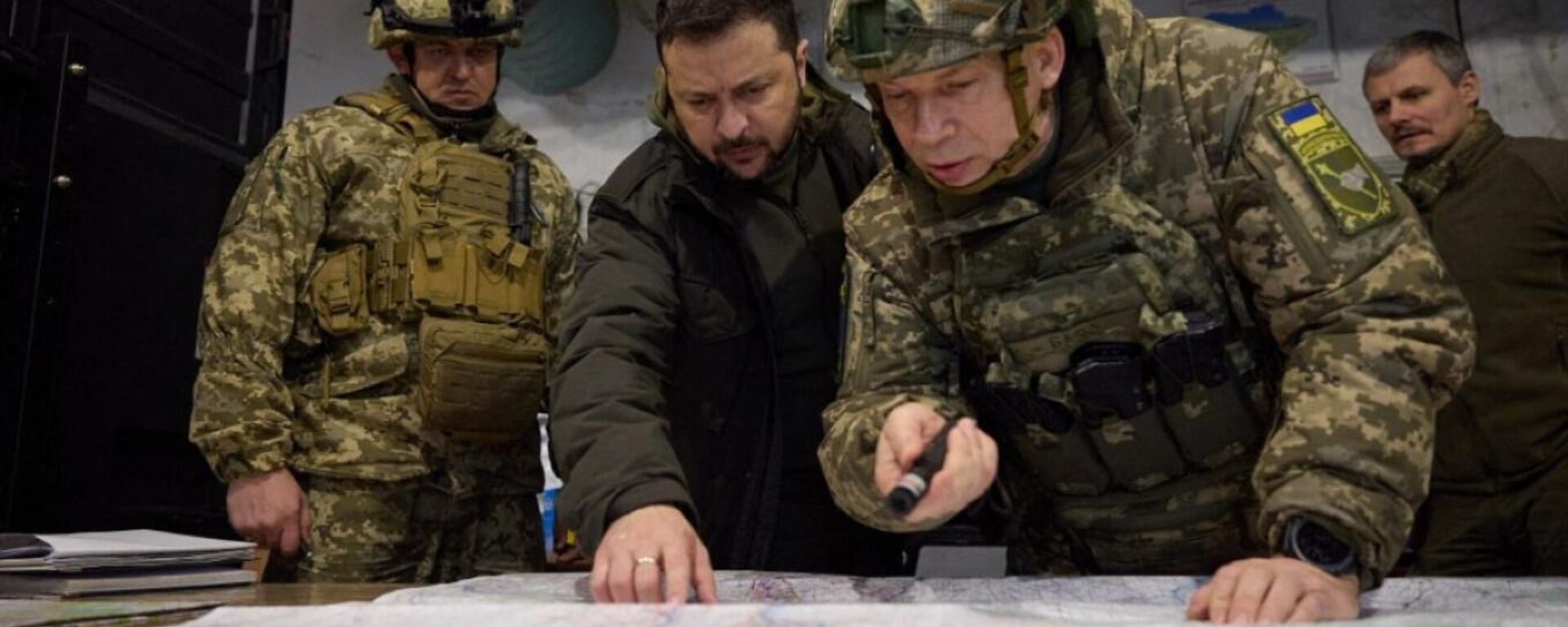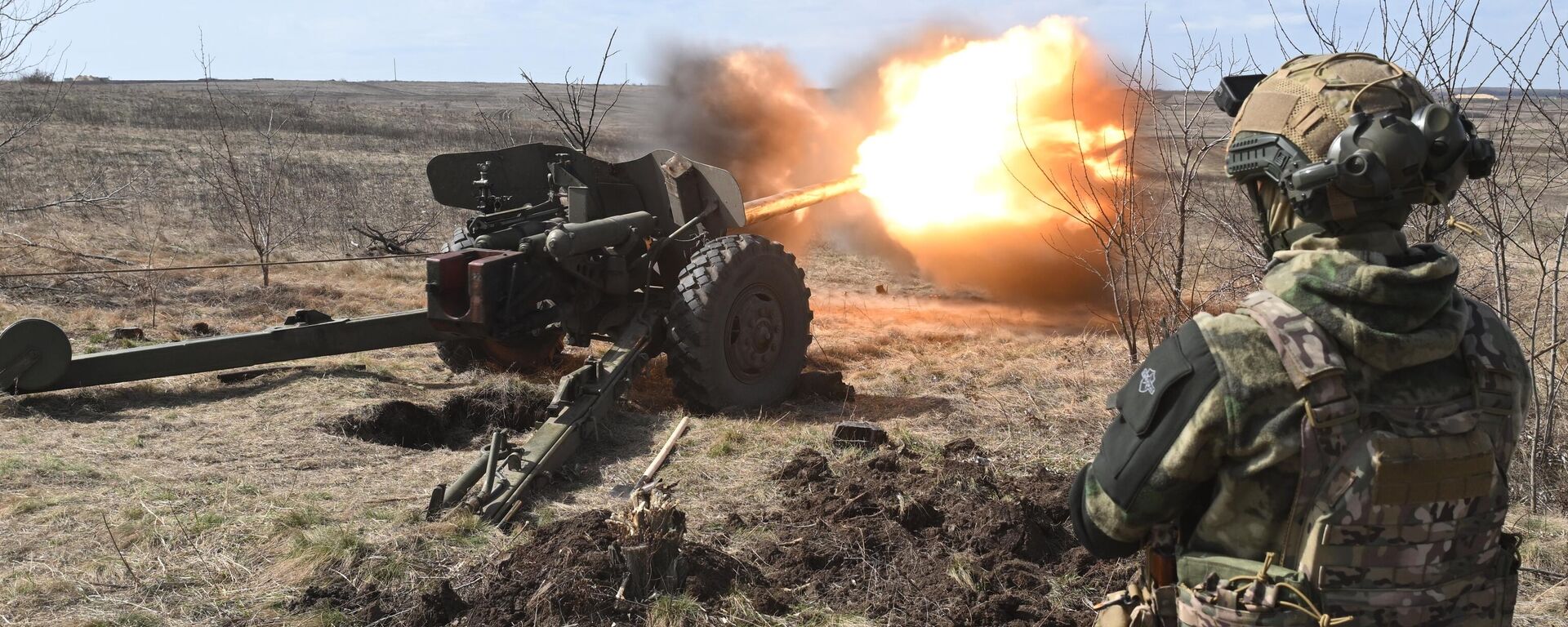Corruption Sped Up Ukraine's Retreat More Than Weapons Shortage
15:57 GMT 04.05.2024 (Updated: 13:35 GMT 24.11.2025)

© AP Photo / Evgeniy Maloletka
Subscribe
The rapid crumbling of Ukrainian defenses, leading to military retreat, prompts questions about the Kiev regime's failure to maintain the front line.
Russian troops continue to advance along the entire 1000-kilometer-long front line and squeeze the Ukrainian military from the Donetsk People's Republic after the liberation of Avdeyevka. After taking control of Chasov Yar and Ocheretino, the Russian Armed Forces will get access to the Slavyansk-Kramatorsk agglomeration and destroy the Kiev regime's defense line west of Avdeyevka.
Ukrainian President Volodymyr Zelensky has consistently criticized the West for hesitating to provide air defense systems, weapons, and ammunition, citing it as the primary reason for his military's failures. However, it has been revealed that the shortage of ammunition has not been the Ukrainian Army's main issue.
Kiev previously allocated almost 38 billion hryvnia ($960 million) to build a multi-layered network of fortifications; however, Ukrainian troops testify that the lines of defense barely exist, as quoted by the Associated Press. The Ukrainian military contends that these works should have been completed last year during a temporary operational pause, rather than amid a retreat.
"One can assume that a year ago, when the budget was planned, Ukrainians didn't believe that the counteroffensive would fail. In general, the strategy was to attack and establish defensive positions on newly acquired territories. That is, fortifications were meant for offense, not defense," Vadim Kozyulin, head of the Institute of Contemporary International Studies Under Diplomatic Academy of Russia's Ministry of Foreign Affairs, told Sputnik.
"But the situation has changed. Moreover, we see that this happened rapidly, and, most likely, unexpectedly. The Ukrainians probably saw what it was leading to, but they could not openly admit it, because they feared it could impact financing. They had to maintain some kind of optimism among Western partners. This let them down, catching them off guard," he explained.
"The second issue is corruption. It's an old Ukrainian problem and we don’t know its extent, given that everything is classified amid the hostilities," the expert continued.
Where is the Money?
Funds allocated to strengthen Ukrainian defenses were stolen with the tacit approval of the nation's government officials, presumed Vadim Mingalev, a military expert and political analyst.
He likewise drew attention to the fact that Andriy Yermak, a Ukrainian film producer who was appointed by Zelensky as the head of his office, supervised the project. The Ukrainian president also played a role in this farce by visiting the sites that were nothing short of Potemkin villages, i.e. an impressive facade designed to hide an inconvenient truth, the expert noted.
According to Mingalev, the fuss surrounding the US $61 billion tranche arose from the Kiev regime's desire to allocate a portion of these funds towards its delayed fortification construction projects.
"As in any construction business, a certain estimate is first prepared," the military expert said, explaining how the money might have vanished. "The estimate is then increased by one and a half or two times. Then, as construction progresses, it can go up three times, and so on. Accordingly, a certain amount of concrete, cement, and other building materials are not supplied for creating the defensive lines. What's on paper often differs significantly from what is actually delivered. There is a rather sophisticated scheme [to steal funds]."
Military purchases and tenders are currently classified and do not go through Ukraine's public procurement platform ProZorro, allowing corrupt politicians and their business partners to steal quietly, according to Kozyulin. Moreover, he added, the same individuals who seize these funds are responsible for overseeing their expenditure.
One might ask why Ukrainian authorities and business sectors are shooting themselves in the foot by undermining the country's defensive capabilities.
"Ukrainian oligarchs who support Zelensky and work with him understand perfectly well that their fate is sealed, and they are laying the groundwork for departure. While preparing to escape Ukraine, they create some kind of financial safety net for themselves," Mingalev explained.
Echoes of Zelensky-Zaluzhny Clash
Contradictions between the Ukrainian civil authorities and the army still exist, according to Sputnik's interlocutors.
Kozyulin wonders what happened to former Commander-in-Chief General Valery Zaluzhny, who was named the new Ukrainian envoy in the UK in March but has remained in the shadows since. The expert doesn't rule out that the maverick general was arrested. Last November, Zaluzhny openly advocated Ukraine going on the defensive, much to the displeasure of Zelensky and his party fellows.
"I think that the defensive line problem partly arose from those contradictions. That is, politicians said Ukraine would advance. The military retorted there were not enough forces for an offensive, Ukraine needed to go on the defensive (…) But for politicians, this meant damaging relations with [Western] donors who expected quick successes [on the battlefield] in exchange for their money. As a result, the defensive structures fell prey to the internal skirmishes."
The situation appears bleak to the West, which had received assurances from the Kiev regime regarding the construction of defenses and the Ukrainian Armed Forces' ability to withstand the Russian advance, according to Sputnik's interlocutors. The experts suggested that the Zelensky regime deceived its backers, raising the possibility that Western politicians may also be implicated in Ukraine's systemic corruption.




